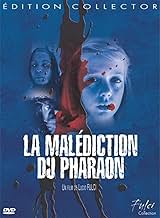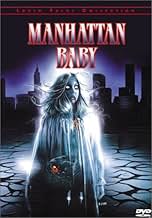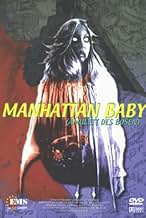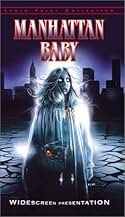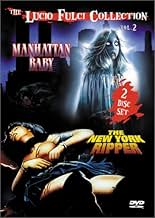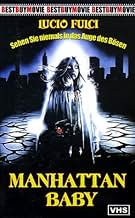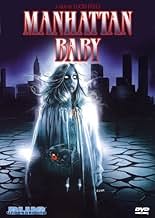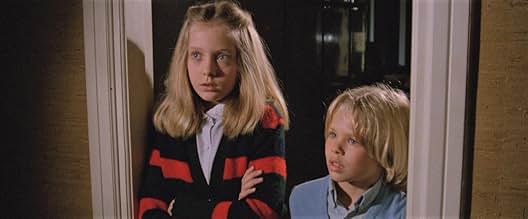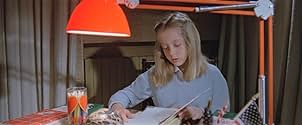VALUTAZIONE IMDb
4,8/10
3534
LA TUA VALUTAZIONE
Un archeologo apre una tomba egizia e rilascia accidentalmente uno spirito maligno. La sua giovane figlia viene posseduta dall'entità liberata e, al suo arrivo a New York, iniziano i sanguin... Leggi tuttoUn archeologo apre una tomba egizia e rilascia accidentalmente uno spirito maligno. La sua giovane figlia viene posseduta dall'entità liberata e, al suo arrivo a New York, iniziano i sanguinosi omicidi.Un archeologo apre una tomba egizia e rilascia accidentalmente uno spirito maligno. La sua giovane figlia viene posseduta dall'entità liberata e, al suo arrivo a New York, iniziano i sanguinosi omicidi.
- Regia
- Sceneggiatura
- Star
Laura Lenzi
- Emily Hacker
- (as Martha Taylor)
Cosimo Cinieri
- Adrian Mercato
- (as Laurence Welles)
Enzo Marino Bellanich
- Wiler
- (as Vincenzo Bellanich)
Tonino Pulci
- Orderly
- (as Antonie Pulci)
Martin Sorrentino
- Caretaker
- (non citato nei titoli originali)
Recensioni in evidenza
So, what's the worst Fulci film you've sat through? Is it Sweet House of Horrors? Well, that had some gore in it at least. Or it Aenigma? That one had some women in the scud, and a picture stabbing itself. Or is it Conquest? Well, I reckon that one is a classic myself, because it's got drug snorting werewolf men in it.
Nope, for me it's Manhattan Baby. I've sat through 14 of his films now, and even his later period films like the deranged Cat in the Brain are more entertaining than this. It's taken me three viewings to get a handle on what story there is, and it does have some positive aspects, but Fulci completely fumbles the ball on this film.
It starts off really well, in Egypt, where Christopher Connelly is doing some sort of dig into an ancient tomb. His wife and daughter, meanwhile, almost immediately fall into Fulci's nightmare world, when a blind (like the Beyond) woman hands the kid an amulet. Connelly, on the other hand, breaks into the tomb only to get his guide killed and himself blinded by purple laser beams (eh?).
This is all atmospherically done, but the moment the family return to New York, the film slips its moorings. Strange things begin to happen, like Tommy, Connelly's son, walking into a cupboard filled with light. But it's okay, because a few scenes later he's back, and nobody really cares anyway.
That's the main problem with this film. Fulci goes for the same disjointed series of scares that worked so well in The Beyond, but here manages to completely arse up just about every scene but making it either too inexplicable, too tame, or just too stupid. Sometimes the kids are terrified by what's happening, and yet other times they think it's some sort of game. Plus, there's almost no linking between the scenes whatsoever, no attempt to let the audience in on what's happening, until that last twenty minutes, and by that time I swear you'll be beyond caring. The final insult is that the ending is as lame as a one-legged donkey.
There are some positive aspects to this film that raise the rating slightly. The cinematography is uniformly excellent, the Egyptian scene is a great way to start the film, and there's a couple of scenes that do genuinely work, like the Psychic rolling about on the floor, screaming in Connelly's daughter's voice.
I'd love to know if this was the film that Fulci intended, because I don't reckon it is. There's too many hints that something went badly wrong in production, like the disjointed story or the recycled soundtrack (from the Beyond).
Only to be viewed as a person familiar with Fulci's work. I'd hate to see some unsuspecting horror fan's reaction to this mess.
Nope, for me it's Manhattan Baby. I've sat through 14 of his films now, and even his later period films like the deranged Cat in the Brain are more entertaining than this. It's taken me three viewings to get a handle on what story there is, and it does have some positive aspects, but Fulci completely fumbles the ball on this film.
It starts off really well, in Egypt, where Christopher Connelly is doing some sort of dig into an ancient tomb. His wife and daughter, meanwhile, almost immediately fall into Fulci's nightmare world, when a blind (like the Beyond) woman hands the kid an amulet. Connelly, on the other hand, breaks into the tomb only to get his guide killed and himself blinded by purple laser beams (eh?).
This is all atmospherically done, but the moment the family return to New York, the film slips its moorings. Strange things begin to happen, like Tommy, Connelly's son, walking into a cupboard filled with light. But it's okay, because a few scenes later he's back, and nobody really cares anyway.
That's the main problem with this film. Fulci goes for the same disjointed series of scares that worked so well in The Beyond, but here manages to completely arse up just about every scene but making it either too inexplicable, too tame, or just too stupid. Sometimes the kids are terrified by what's happening, and yet other times they think it's some sort of game. Plus, there's almost no linking between the scenes whatsoever, no attempt to let the audience in on what's happening, until that last twenty minutes, and by that time I swear you'll be beyond caring. The final insult is that the ending is as lame as a one-legged donkey.
There are some positive aspects to this film that raise the rating slightly. The cinematography is uniformly excellent, the Egyptian scene is a great way to start the film, and there's a couple of scenes that do genuinely work, like the Psychic rolling about on the floor, screaming in Connelly's daughter's voice.
I'd love to know if this was the film that Fulci intended, because I don't reckon it is. There's too many hints that something went badly wrong in production, like the disjointed story or the recycled soundtrack (from the Beyond).
Only to be viewed as a person familiar with Fulci's work. I'd hate to see some unsuspecting horror fan's reaction to this mess.
Manhattan Baby is Fulci's dive into beautiful imagery. There's some scenes in this one that are genuinely breathtaking.
A medallion from an archaeological dig leaves a man blind. And a family falls into jeopardy after their son disappears into thin air, and their daughter is possessed by an ancient demon.
If the budget hadn't been cut for the film, I would imagine that this would be Fulci's most memorable film. People would think 'Manhattan Baby' instead of 'Zombie' when they heard the name Lucio Fulci.
Most horror fans haven't seen this one. It's true that MB isn't a film that succumbs to everyone's tastes. This is simply because in most Italian films, it's usually style over substance, which in some cases can leave an unseasoned viewer in total awe at the apparent inept plot line before them.
In Italian films (especially), you have to pay very close attention to the whole film. Certain plot definers aren't given 'camera-attention' at crucial times at any given time through any given film. in American films, the camera tells the story. The same can be said for Italian cinema, but a lot of times, it's much more subtle in its delivery and can leave one feeling incomplete until they eventually see it again.
Anyway, should you watch Manhattan Baby? Sure. I'll recommend it. It's a beautifully shot film with hardly any of that Fulci gore we all expected. It also has a great Gothic score that adds tons of surrealistic atmosphere that pulls you in for the most part.
Not a film for everyone, but the guru's of the cinema world will find a lot of redeeming qualities to talk about.
A medallion from an archaeological dig leaves a man blind. And a family falls into jeopardy after their son disappears into thin air, and their daughter is possessed by an ancient demon.
If the budget hadn't been cut for the film, I would imagine that this would be Fulci's most memorable film. People would think 'Manhattan Baby' instead of 'Zombie' when they heard the name Lucio Fulci.
Most horror fans haven't seen this one. It's true that MB isn't a film that succumbs to everyone's tastes. This is simply because in most Italian films, it's usually style over substance, which in some cases can leave an unseasoned viewer in total awe at the apparent inept plot line before them.
In Italian films (especially), you have to pay very close attention to the whole film. Certain plot definers aren't given 'camera-attention' at crucial times at any given time through any given film. in American films, the camera tells the story. The same can be said for Italian cinema, but a lot of times, it's much more subtle in its delivery and can leave one feeling incomplete until they eventually see it again.
Anyway, should you watch Manhattan Baby? Sure. I'll recommend it. It's a beautifully shot film with hardly any of that Fulci gore we all expected. It also has a great Gothic score that adds tons of surrealistic atmosphere that pulls you in for the most part.
Not a film for everyone, but the guru's of the cinema world will find a lot of redeeming qualities to talk about.
On a trip to Egypt with her archaeologist father, Professor George Hacker (Christopher Connelly) and photographer mother, Emily (Laura Lenzi), young Suzie (Brigitta Boccoli) begins having bizarre experiences involving things of a mystical nature. With her parents too busy to notice, Suzie encounters a strange person who gives her a very distinctive amulet. Meanwhile, dad has an Indiana Jones-style adventure of his own, getting blinded in the process.
Back home in NYC, it's back to life as usual.
Oh no!
Suzie's new amulet has its own spooky theme music! This can mean only one thing! Yes indeed, she's become the tool of some peevish supernatural entity! It's not long before all manner of weirdness breaks out.
MANHATTAN BABY is another of Director Lucio Fulci's supernatural horror offerings. As such, it's pretty solid, featuring some of his signature gruesomeness and eyeball closeups. The novel story has a few nice twists and ideas.
BEST BITS: #1- Death by elevator! Not in the usual manner! #2- The overdue demise of Emily's utterly annoying, "wacky glasses"-wearing, imbecilic coworker, Luke (Carlo De Mejo)! #3- Snake-cam / death by cobra! #4- "Poor Jamie Lee!" #5- Dead bird attack! Fishing line holding up the birds? You didn't see annnything!...
Back home in NYC, it's back to life as usual.
Oh no!
Suzie's new amulet has its own spooky theme music! This can mean only one thing! Yes indeed, she's become the tool of some peevish supernatural entity! It's not long before all manner of weirdness breaks out.
MANHATTAN BABY is another of Director Lucio Fulci's supernatural horror offerings. As such, it's pretty solid, featuring some of his signature gruesomeness and eyeball closeups. The novel story has a few nice twists and ideas.
BEST BITS: #1- Death by elevator! Not in the usual manner! #2- The overdue demise of Emily's utterly annoying, "wacky glasses"-wearing, imbecilic coworker, Luke (Carlo De Mejo)! #3- Snake-cam / death by cobra! #4- "Poor Jamie Lee!" #5- Dead bird attack! Fishing line holding up the birds? You didn't see annnything!...
If you have some acquaintance with other Fulci films, especially the ones from the so-called "Gates of Hell Trilogy", then you know that eyes are, to say at least, a repetitive motive, from the gore set pieces, like the nail killing in "L'aldilà" (eng: The Beyond), to the many eye close-up shots in the dialogue scenes of "Manhattan Baby". Against this general background, this movie can be regarded as a key film. Here, Fulci is somewhat presenting in a very explicit way the coding of the eyes (and The Eye) in his own cinematic style.
While travelling in Egypt with his mother and his archeologist father, a girl receives an ancient medallion representing an eye (very similar to the Eye of Horus) from a mysterious white-eyed woman that then disappears in the air (literally). Almost at the same time, her father is blinded by the same eye-shaped symbol, only this one is carved in the wall of an underground tomb inside a forbidden pyramid. The family goes back to New York and there the medallion starts to exert its influence, taking control over the girl, triggering supernatural events in the family's apartment and opening a portal to another space-time dimension.
The medallion is the divine Eye (its link with divinity is explicitly mentioned in the film), an access to the world of The Beyond. The blind woman that gives the medallion to the girl has white-veiled eyes, just like the blind young woman with the dog and the main characters at the end of "L'aldilà". We know, from this last movie, what these white eyes can mean in the Fulci code: vision-knowledge of the other side, and the ability to move between that place and this human dimension. But we also have the fragile human eyes (e.g. the eyes of the father) and mundane blindness: the inability to see and to understand.
On a more stylistic level, we have all the already mentioned eye close-up shots during dialogues. The tension, the real intensity is always happening at the level of looks in Fulci and almost never at the level of words. Language is often banal and stereotyped in this film, as in many others by this director. Characters in the worldly sphere also tend to be very one-dimensional: the father is the scientist, the man of reason, the babysitter is the beautiful and lively girl, the parapsychologist is the somewhat sinister and dark man surrounded by antiques and stuffed birds, etc. And then there's that simple and repetitive sax score during many of the urban sequences, an almost vulgar soundtrack that is in violent contrast with the fantastic chaos raised by the medallion. It is Fulci's violent cut between the worlds, the one that seem to disconcert many viewers and that is also violently translated to cinematic form by this director. The cut between an abysmally stereotyped everyday human world, the world of frightened and fragile human eyes and the powerful world of The Eye that lies Beyond.
While travelling in Egypt with his mother and his archeologist father, a girl receives an ancient medallion representing an eye (very similar to the Eye of Horus) from a mysterious white-eyed woman that then disappears in the air (literally). Almost at the same time, her father is blinded by the same eye-shaped symbol, only this one is carved in the wall of an underground tomb inside a forbidden pyramid. The family goes back to New York and there the medallion starts to exert its influence, taking control over the girl, triggering supernatural events in the family's apartment and opening a portal to another space-time dimension.
The medallion is the divine Eye (its link with divinity is explicitly mentioned in the film), an access to the world of The Beyond. The blind woman that gives the medallion to the girl has white-veiled eyes, just like the blind young woman with the dog and the main characters at the end of "L'aldilà". We know, from this last movie, what these white eyes can mean in the Fulci code: vision-knowledge of the other side, and the ability to move between that place and this human dimension. But we also have the fragile human eyes (e.g. the eyes of the father) and mundane blindness: the inability to see and to understand.
On a more stylistic level, we have all the already mentioned eye close-up shots during dialogues. The tension, the real intensity is always happening at the level of looks in Fulci and almost never at the level of words. Language is often banal and stereotyped in this film, as in many others by this director. Characters in the worldly sphere also tend to be very one-dimensional: the father is the scientist, the man of reason, the babysitter is the beautiful and lively girl, the parapsychologist is the somewhat sinister and dark man surrounded by antiques and stuffed birds, etc. And then there's that simple and repetitive sax score during many of the urban sequences, an almost vulgar soundtrack that is in violent contrast with the fantastic chaos raised by the medallion. It is Fulci's violent cut between the worlds, the one that seem to disconcert many viewers and that is also violently translated to cinematic form by this director. The cut between an abysmally stereotyped everyday human world, the world of frightened and fragile human eyes and the powerful world of The Eye that lies Beyond.
We selected "Manhattan Baby" from the movie library last night, and I realized that it was to be probably the 7th time I have watched this rather uncelebrated Fulci offering in the past 5 years. Yes, this movie is a bit formulaic, and yes, it does move a bit slow in parts. But there is something undeniably menacing in this movie, an atmosphere of claustrophobia, the tightness of the endless close-ups of people's faces, that I enjoy and (obviously) come back to again and again. No, this is not a gory movie, which no doubt comes as a surprise (disappointment?) to fans of Fulci's other (mostly excellent) films. Even the death scenes, of which there are only 3 or 4, have minimal blood compared to something like "The Beyond", not that I would recommend this as hearty family fare by any means. But if you enjoy the uniquely "European" dreamlike atmosphere created by a combination of cheesy effects, plot holes, wooden acting, bad dubbing, and inexplicable motivations of characters, this may be one you revisit again, and again and again... you get the idea.
Lo sapevi?
- QuizThe name of the character Adrian Marcato is borrowed from Rosemary's Baby - Nastro rosso a New York (1968). The title "Manhattan Baby" was also derived from the title of the Polanski film, despite Director Lucio Fulci hating the title, and Screenwriter Dardano Sacchetti preferring his title "The Evil Eye". That version of the title was reworked in the US to " Eye of the Evil Dead", deriving from Sam Raimi's classic "The Evil Dead". Raimi was at first irritated, but learned Fulci's background with having no leverage over distribution decisions, and more or less felt bad for him and took no legal action.
- BlooperReflected in the archaeologist's big sunglasses when we see him in his office in New York near the beginning of the film.
- Versioni alternativeThe Anchor Bay release under the original title "Manhattan Baby" is the complete, uncut version, containing all the gore and violence.
- ConnessioniFeatured in Beyond the Living Dead (2001)
I più visti
Accedi per valutare e creare un elenco di titoli salvati per ottenere consigli personalizzati
- How long is Manhattan Baby?Powered by Alexa
Dettagli
Botteghino
- Budget
- 300.000 USD (previsto)
- Tempo di esecuzione1 ora 29 minuti
- Mix di suoni
- Proporzioni
- 2.35 : 1
Contribuisci a questa pagina
Suggerisci una modifica o aggiungi i contenuti mancanti

Divario superiore
By what name was Manhattan Baby (1982) officially released in India in English?
Rispondi

